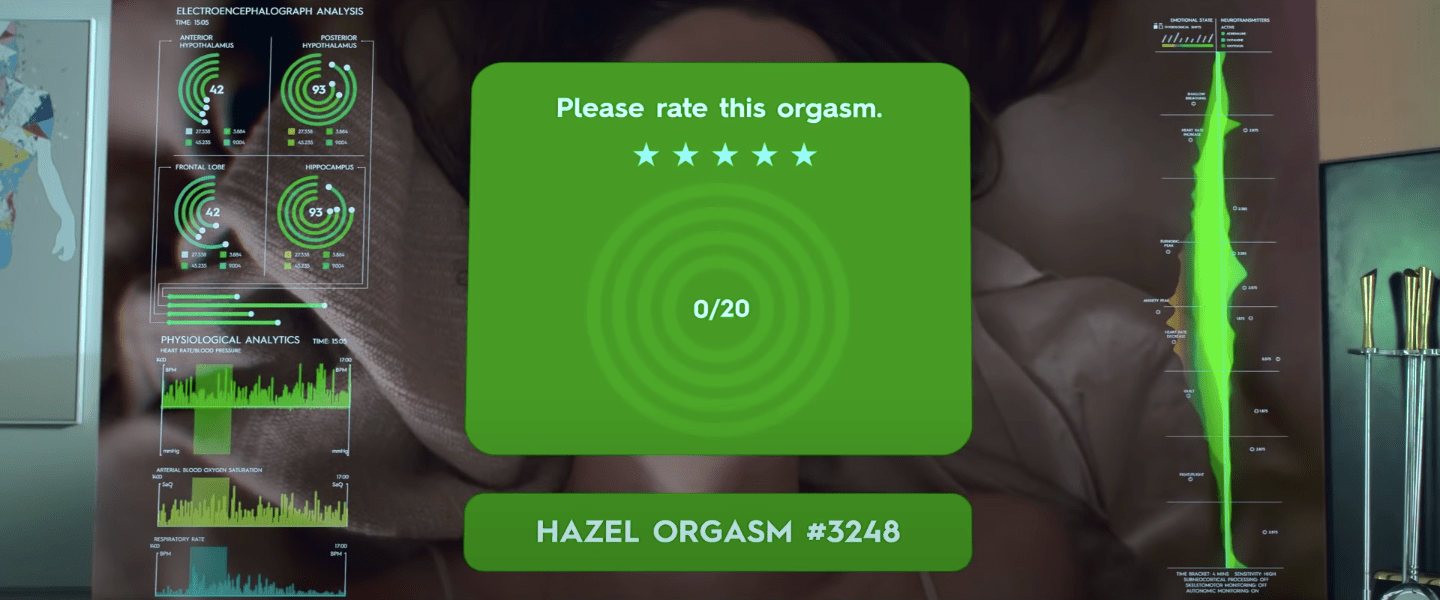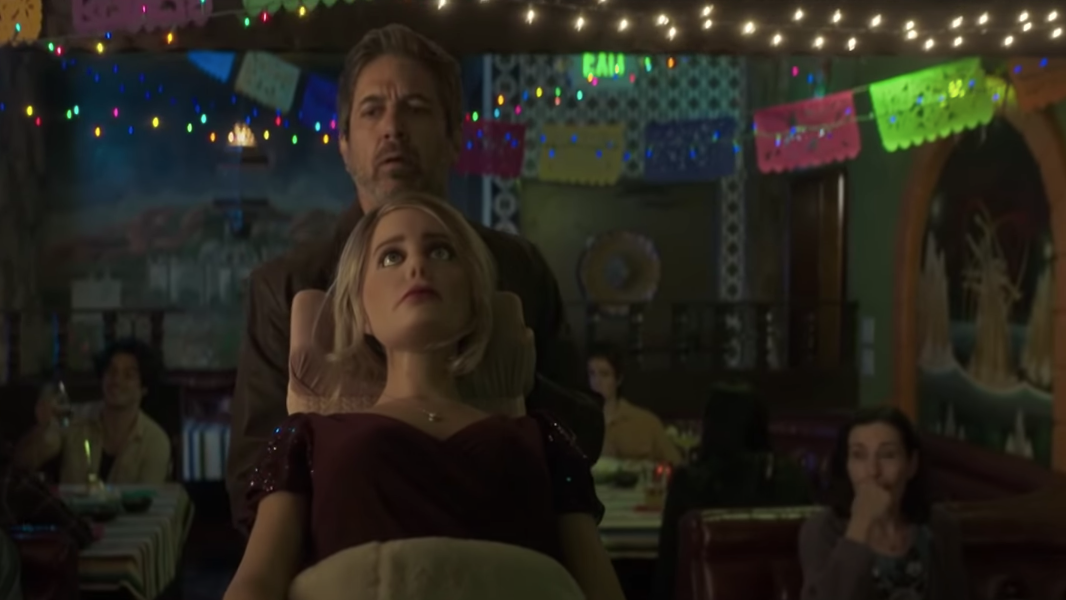Though HBO Max’s new series Made For Love, an adaptation of Alissa Nutting’s 2017 novel of the same name, is charged with the same foreboding dread about a technology-saturated near future that’s present in Black Mirror, the show imagines a hero who has enough sense to understand how messed up the world she lives in is.
Black Mirror and other techno panic-y stories like it tend to centre characters seemingly caught up in the thick of Twilight Zone plots that strip them of their ability to operate with basic common sense. But Made For Love — starring Cristin Milioti, who coincidentally starred in one of the best Black Mirror episodes — instead spotlights a young woman perfectly situated to recognise the direness of her situation. Before the series (which debuted its first three episodes last week) explains the specific circumstances that brought housewife Hazel Green (Palm Springs’ Milioti) and her husband, tech luminary Byron Gogol (Aladdin’s Billy Magnussen), into each other’s lives, it first establishes the ridiculous lengths Hazel’s willing to go to in order to escape from the compound-like home the couple shares somewhere in the desert.
[referenced id=”1682080″ url=”https://gizmodo.com.au/2021/03/hbos-dark-comedy-made-for-love-just-got-darker-and-funnier/” thumb=”https://gizmodo.com.au/wp-content/uploads/2021/03/24/heir7nu307azaebp0bvi-300×169.png” title=”HBO’s Dark Comedy Made for Love Just Got Darker and Funnier” excerpt=”When we saw the first trailer for HBO Max’s upcoming series Made for Love, we learned it was about Hazel (Cristina Miloti) trying to escape her relationship with a possessive tech billionaire (Billy Magnussen), only to discover he’d put a chip in her head that allowed him to track not…”]
Though Made For Love plays elements of Hazel’s escape from her marital pseudo-prison for laughs, the show never lets you forget that it’s quite serious in its discussion of how the money and power begotten by way of modern-day technologies aren’t the magic bullets that Silicon Valley types insist they are. As Hazel stumbles through the wilderness, disoriented but elated at her newfound freedom, Made For Love begins fleshing out the details of its world that bears the undeniable marks of Byron’s outsider, Google-like influence on society (yes, his company is literally named “Gogol”). Everything from the phones and tablets people carry to the very data systems that bring them together through their device’s connections are testaments to Gogol’s power. Here, reflecting on our own society, the company has become so great to the point that most people simply don’t care about the obvious nefariousness present.

Byron Gogol’s greatest trick was convincing the public to literally buy into his vision of a future where technology created to help him overcome his own debilitating inability to relate to other people is considered normal. In flashbacks interspersed with the present, Made For Love shows you how Hazel, like most everyone else in the world, accepted Gogol into her relatively ordinary life with little question. The sheer improbability of that ever happening is part of what made the couple’s meeting so magical for Hazel — at first — but as the premiere opens, she’s more than familiar with the insidious ways that Byron uses his eccentricities to (poorly) mask his profound brokenness from the world.
While everyone else on the planet believes that Byron’s still-in-development “Made For Love” neural implant he’s testing on his pool-circling pet dolphin, Zelda, is the first step toward Gogol’s research into communicating with animals, Hazel knows the dark truth from firsthand experience. At some point into their decade-long marriage, after having long since realised that she and Byron weren’t compatible, Hazel was stunned to discover that she, like Zelda, had been chipped by Byron without her knowledge or consent. The story frames Hazel’s chip as the final straw that prompts her to finally follow through on the wild escape she’d likely been dreaming up for years, but as the series unfolds, she soon realises how physically leaving Byron’s only the beginning of her fight.
[referenced id=”1677378″ url=”https://gizmodo.com.au/2021/03/made-for-love-shows-breaking-up-with-a-possessive-tech-billionaire-is-hard-to-do/” thumb=”https://gizmodo.com.au/wp-content/uploads/2021/03/05/hj7ljb3u0zvvwxx1hqe1-300×169.jpg” title=”Made for Love Shows Breaking Up With a Possessive Tech Billionaire Is Hard to Do” excerpt=”Especially when he plants a chip in your head, without your knowledge or consent, which allows him to track you (and seemingly a lot more) after you try to escape your loveless, 10-year marriage and go on the run.”]
Principled and grounded a person as Hazel is, the story doesn’t make her out to be an intentionally transformative or revolutionary figure, but rather, a regular woman who was perfectly content to mind her own business until she because the object of fascination of a man with entirely too much money and time at his disposal. No matter where Hazel goes or who she asks for help, Byron not only knows where she is, but actually sees through her eyes, hears through her ears, and reads her vital signs via the implant. All of this serves to reinforce the fact that even if people were to believe her story, there’s little they could do individually to fight back against him. Even more menacing, though, is Byron’s true goal of implanting himself with a Made For Love chip that would leave his and Hazel’s minds intricately interwoven.
Because Hazel’s been abused and traumatized, and because there are so many ideas swirling around the early episodes, it takes a bit of time before the character Milioti’s going for really becomes clear. Though happenstance makes her the unwitting leader of a campaign of one committed to decry Byron and Gogol for being blights unto society, Made For Love shows you that Hazel wasn’t above accepting the luxury her new lifestyle afforded her, or immune to the wonder that Byron’s tech was crafted to light up in people. Part of the reason for this was her upbringing, which is touched on a bit in the flashbacks, but mostly becomes clear when she seeks out help from her father Herbert (Ray Romano), a widower who’s found new purpose in life after starting a one-sided relationship with a sex doll.

Magnussen’s Byron will remind you of any number of the alarmingly-squared jawed villains who’ve enjoyed residencies within Ryan Murphy’s American Horror Story-verse, as well as Matt Ross’ Gavin Belson, Silicon Valley’s barely-heightened parody of basically every modern-day tech CEO. Made For Love alternates between depicting Byron as an out-of-touch megalomaniac of the Patrick Bateman variety and a clueless, helpless man who, in a different set of circumstances, could have benefited greatly from having some actual friends in his life who weren’t also his employees. For instance, Byron’s researcher Fiffany (Harry Potter and the Cursed Child’s Noma Dumezweni) — who earnestly leads the chip research with the hopes of changing the world for the better — knows that her boss is a few venture capitalists short of having a Series A round of morality.
But Fiffany, Hazel, and others abided by his wild whims because it’s what society expected of them, and that reality is ultimately what Made For Love sets up as the challenge Hazel’s up against. By making her journey one about leaving a profoundly abusive, exploitative marriage to the embodiment of modern capitalism, the story is about the personal sphere as much as the public one — similar to Marvel’s WandaVision when it straddled the gap between Westview and the MCU outside of the Hex. Glitches feature largely throughout Made For Love’s effective reminders of just how near-futuristic its world’s meant to be, and while its VFX never really becomes dazzling, that too serves as a reminder that the ideas the show’s working with aren’t really all that far fetched.
Made For Love might not be the kind of wild, action-packed ride people imagine themselves tuning in to watch week-to-week in the era where streaming services are behaving more and more like terrestrial network television and premium cable. But as a slight shift away from shows about people in capes and aliens descending from the heavens, Made For Love’s a more-than-solid new sci-fi series to dive into.
The first three episodes of Made For Love are now streaming on Stan in Australia and a new instalment drops tomorrow.
